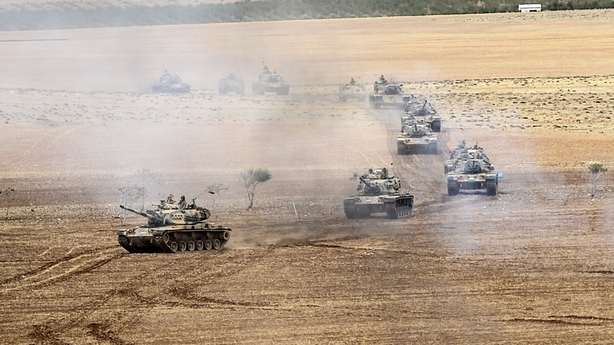Fighters from the Islamic State group have advanced to within 5km of a key Kurdish town on the border between Syria and Turkey, according to a British-based monitoring group.
The Syrian Observatory for Human Rights is reporting that IS fighters are close to the south and southeast of Kobane, also known as Ain al-Arab.
As they advanced, the jihadists fired a volley of at least 15 rockets, hitting the centre of the town for the first time and killing at least one person, said Rami Abdel Rahman from the monitoring group.
"It's the most violent bombardment of the town," he added.
Additional rockets also slammed into the Syrian-Turkish border area, an account confirmed by an AFP photographer on the Turkish side of the frontier.
The photographer said at least one mortar shell had landed on Turkish territory near the Mursitpinar border post, a day after fire from Syrian territory hit the Turkish border town of Suruc, injuring three.
IS militants began a campaign to capture Kobane nearly two weeks ago and have since captured 67 villages surrounding the town.
The fighting has prompted at least 160,000 people to flee across the border into Turkey, and the group's advances have continued despite several strikes by a US-led coalition around the town.
Kobane is Syria's third-largest Kurdish town and would be a key prize for IS, allowing its fighters to complete their control over a long stretch of the Syrian border with Turkey.
Turkey has deployed tanks and armoured vehicles to reinforce its border with Syria amid the escalating violence, as parliament is set to consider whether to authorise military action against IS jihadists.

The army moved tanks and armoured vehicles to the border town of Mursitpinar, which lies across from Kobane, after stray bullets hit Turkish villages, sparking retaliation from Turkey's military under its "rules of engagement".
The Turkish government said it would submit motions to parliament shortly authorising the armed forces to take action in Iraq and Syria, allowing Turkey to join a US-led coalition against the IS fighters.
Netanyahu says nuclear-armed Iran a greater threat
Israel's prime minister Benjamin Netanyahu has said that a nuclear-armed Iran would pose a far greater threat to the world than IS militants.
Speaking at the UN General Assembly Mr Netanyahu said that while IS must be defeated, "to defeat ISIS and leave Iran as a threshold nuclear power is to win the battle and lose the war."
"Iran's nuclear military capabilities must be fully dismantled," he said, adding that the point of Iran's recent "charm offensive" for the West was get international sanctions lifted "and remove the obstacles to Iran's path to the bomb."
US underestimated opportunity for jihadists - Obama
Elsewhere, US President Barack Obama admitted that the United States had underestimated the opportunity that a collapsing Syria would provide for jihadist militants to regroup and stage a sudden comeback.
Speaking to CBS News, the president said that former al-Qaeda fighters driven from Iraq by US and local forces had been able to gather in Syria to form IS.
A US-led coalition of Arab and Western allies has begun an air campaign to counter the group, hitting targets in Iraq and Syria, which Mr Obama called "ground zero for jihadists around the world".
"I think our head of the intelligence community, Jim Clapper, has acknowledged that they underestimated what had been taking place in Syria," Mr Obama said, referring to his director of national intelligence.
Asked whether the US had also overestimated the ability or will of Iraq's US-trained military to fight the jihadists on its own, Mr Obama said: "That's true. That's absolutely true."
He made his comments in an interview with "60 Minutes", which was recorded on Friday and broadcast last night.
Mr Obama said Islamic State propagandists have become "very savvy" in their use of social media, and had lured new recruits "who believed in their jihadist nonsense" from Europe, the US and Australia, as well as from Muslim majority countries.
He said that part of the solution would be for Syria and Iraq to resolve their domestic political crises.
An enduring solution, Mr Obama said, would require "a change in how not just Iraq, but countries like Syria and some of the other countries in the region, think about what political accommodation means".
He added: "The Iraqis have to be willing to fight. And they have to be willing to fight in a non-sectarian way - Shia, Sunni, and Kurd - alongside each other against this cancer in their midst."
Mr Obama said some countries in the region "have now created an environment in which young men are more concerned whether they're Shia or Sunni, rather than whether they are getting a good education or whether they are able to, you know, have a good job".
He made his remarks as US-led air strikes in Iraq aimed to deny IS vital territory and resources.
"We are assisting Iraq in a very real battle that's taking place on their soil, with their troops," Mr Obama said.
"It is in our interest to do that, because ISIL represents sort of a hybrid of not just the terrorist network, but one with territorial ambitions, and some of the strategy and tactics of an army," he said.
Iraq has remained divided since the departure of US troops, with the Sunni population alienated by the authoritarian Shia-led government, and Syria has been in full-blown civil war since 2011.
"This is not America against ISIL," Mr Obama said.
"This is America leading the international community to assist a country with whom we have a security partnership with, to make sure that they are able to take care of their business."

